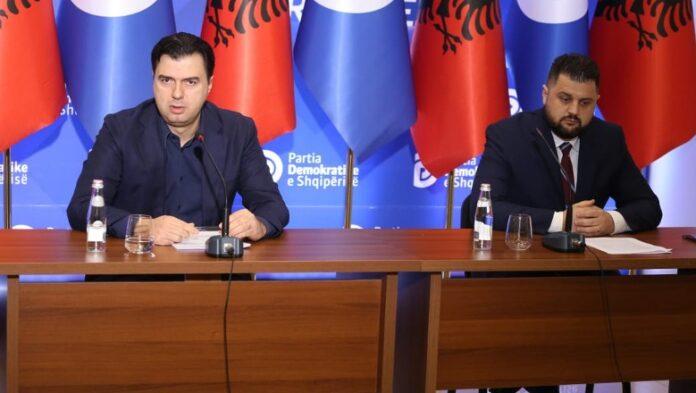The Democratic Party will submit two amendments to the Assembly to support the Special Prosecutor’s Office in the fight against corruption.
The amendments were presented by the secretary for Electoral Reform Rezarta Kthupi and by the Secretary for Legal Affairs Indrit Sefa.
Basha said that both of these proposed amendments are intended to improve the capacities of SPAK, to increase them with a direct effect on the attack on government corruption and organized crime and in this way to serve a purpose, I would say a nationwide priority such as the fight against corruption.
FIRST AMENDMENT
The first amendment is an amendment that aims to regulate Law 95/2016, which is the special law that structures SPAK. Based on the reports presented by KLP and to the Council of European Integration by the head of the special prosecution who related some points that needed support. Or more precisely, some problems that the special structure noticed during the work of its organization, especially in relation to human resources, with the status of magistrates after the end of their function. And let’s say what is the need to adjust the competences or to expand the competences of SPAK, we estimated that we have to make some legal addresses that are related to these two things.
In relation to human resources, it is foreseen in the draft law that we are submitting to the Assembly, it is foreseen within the structure, within the organization of the special structure, to create a new sector, which is the legal aid sector. I appreciate that due to the large level of files that are under investigation today due to their complexity and taking as an example the structures of assistants and legal advisors who work near the Courts of Appeal and the Supreme Court, it is important to create even within the special structure, a special sector aimed at legal advice, following procedures and drafting draft acts in relation to what is the daily work for criminal cases.
The second point that we have proposed in our amendment is the issue of the function or mandate that prosecutors have after completing their mandate in SPAK. In the current law, there was no complete and precise legal regulation. It was envisaged that the KLP would make their appointments after the end of the mandate, but without specifying the position to which they were to be appointed or the length of time within which they were to be appointed. We have made an intervention and a proposal, and in this case in the draft law, which proposal foresees that at the end of the mandate as a prosecutor in the anti-corruption prosecution, all prosecutors whose mandate ends, within a period of 3 months, will be appointed by the KLP- here, in the General Prosecutor’s Office, in the Appeal prosecutor’s offices, or at their request then as the head of the district prosecutor’s offices, guaranteeing at the same time that even after the end of the mandate, they will have the same benefits or financial benefits as they were during the exercise of the function of them as SPAK prosecutors.
These were the two main interventions we made in the law. We think that they are very important in terms of meeting the needs that SPAK has today in terms of human resources, given the volume of work that has been done so far. And with the fact that by legally regulating what happens after the end of the mandate, we give the prosecutors in office today a guarantee that even after they complete this mission, which in our judgment is very important, they will continue to have the protection and benefit that was guaranteed to them initial position.
THE SECOND AMENDMENT
Based on the requests that SPAK has made for the needs of its work, specific requests in the KLP and proposed specific changes, we think that the interventions that are necessary and immediate are related to some of these concerns that SPAK has raised, which is the execution of criminal decisions given by the Special Court. Which means, all the criminal decisions issued by GJKKO, today are executed by the courts of the districts in which the convict is serving his sentence.
We demand that all sentences handed down by the GJKKO, all requests related to the execution of these sentences be judged by the GJKKO. I am taking the case of Sajmir Tahir, in this case it was the court of Elbasan that released him from the cell for a procedural request. In our proposal, there will no longer be a judicial district court to receive these requests, but only GJKKO.
For example, any convict from the GJKKO who requests to benefit from a reduced sentence, or any other request during the execution of the sentence, will no longer be the district courts, but it will be the GJKKO. And this is provided for in Article 470, where we have made a special determination.
We have also asked for extradition, we think that all requests from foreign authorities, from foreign countries for all convicted or wanted persons, who are prosecuted for criminal offenses provided by article 47/a of the criminal procedure code , which are for structured criminal groups, and all in a row, all these requests must be examined by the GJKKO and no longer by the courts of the districts where the party requested to be extradited resides.
Another provision that we have addressed is in article 512 of the code of criminal procedure, the recognition of decisions by us of foreign courts. In the event that these criminal decisions, when administered by the Ministry of Justice, are considered to have criminal offenses which are included in Article 75/a of the criminal procedure code and are like a structured criminal group, then the competent court and for the recognition of these decisions will long live GJKKO.
We have also adapted the legal provisions to the new terminology. Also in the wake of this, we will make a massive intervention in the law number 10993, dated 03.09.2009, on the jurisdictional relations of foreign authorities in criminal matters. Which means that this law is from 2009 and the provisions of the criminal procedure code have not been adapted yet. In addition, with the provisions proposed by us, some competences in this law will fundamentally change, we will propose a draft law which will adapt all our proposals and will be reformatted. This is in terms of the institutional package in the criminal procedure code and in the special law.












